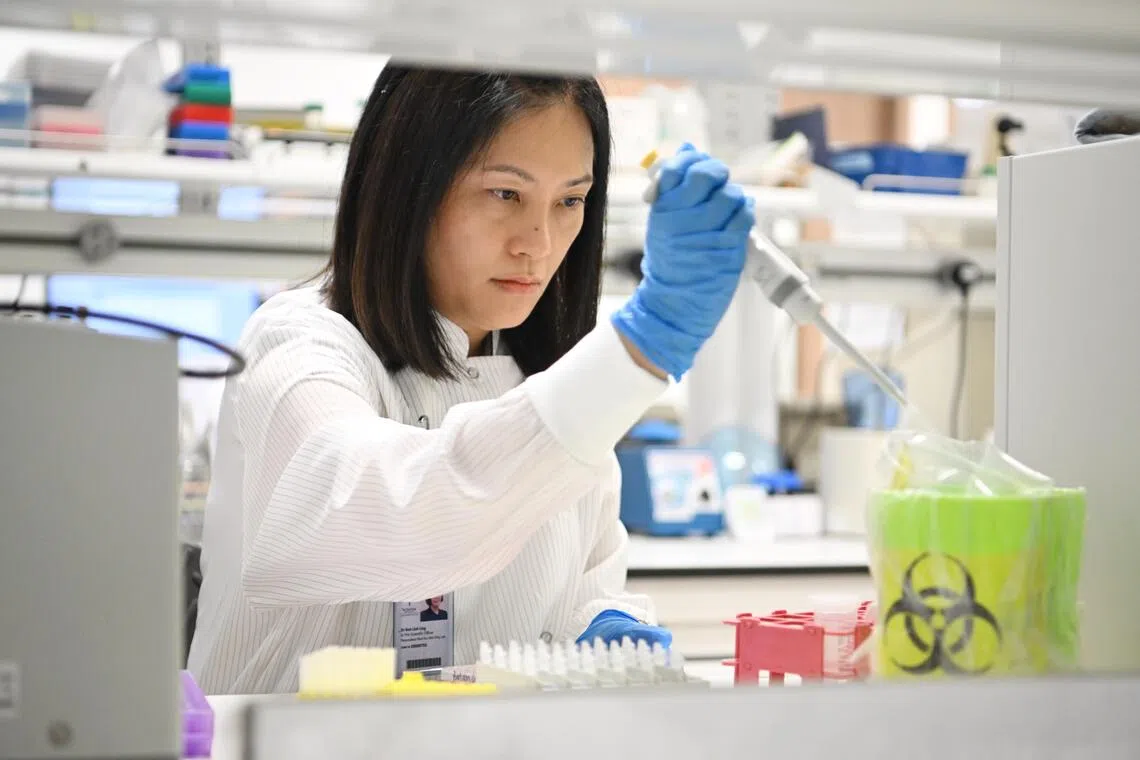SINGAPORE – Singapore has launched the third phase of its national programme to map genomes for preventive, personalised treatments, aiming to gather data from 400,000 to 450,000 patients recruited directly from healthcare settings.
Precision medicine is a targeted approach to disease treatment and prevention that takes into account individual differences in genes, environments and lifestyles.
Running from 2025 to 2031, phase three of the National Precision Medicine (NPM) programme will enrol patients across a wide spectrum of health conditions, enabling researchers to study how genetic, lifestyle, and environmental factors interact in real-world clinical settings.
This will deepen the understanding of disease progression, enabling them to tailor treatment, and ultimately customise care for each patient.
Having a large sample size will also help with the detection of rare diseases and less common genetic variants in the population.
“We must move from a system that reacts to illness to one that predicts and prevents it – and ultimately preserves health,” said Health Minister Ong Ye Kung on Nov 14 at the launch at Marina One West Tower.
“When the deep biological insights of genomics are combined with the predictive power of AI plus the policies of preventive care and population health, we transform the healthcare system in a very fundamental way,” he said.
“This is the foundation for a new kind of healthcare, one that not just treats illness and cure individual patients, but keeps people healthy for longer and is potentially more effective and sustainable even as our population ages.”
NPM is a multi-year, three-phase effort that started in 2017.
Phase one involved creating the pilot database of 10,000 Singaporean genomes (SG10K), while phase two, launched in 2020, involved mapping the DNA of 100,000 healthy Singaporeans (SG100K). The programme has so far sequenced over 100,000 Singapore residents.
In phase three, the coordinating body of NPM – Precision Health Research, Singapore (Precise) – is partnering Singapore’s three healthcare clusters: National Healthcare Group, National University Health System and SingHealth.
Called SG500K, phase three will transition precision medicine in Singapore from early studies to population-scale implementation.
Over the next few years, the three healthcare clusters will recruit another 400,000 to 450,000 participants, on top of the current 100,000 participants.
When phase three concludes, more than 500,000 participants – or about 10 per cent of Singapore’s local resident population – will have had their whole genome sequenced.
Research under NPM has advanced national health initiatives, notably the creation of Genomic Assessment Centres that allow for earlier diagnosis and better management of familial hypercholesterolemia (FH). This is a genetic condition that greatly increases the risk of heart disease.
More than 200 individuals have consented to genetic testing under the FH programme since it was launched in June, Mr Ong said.
Precise has also run five clinical pilots involving over 6,000 patients that explored how genetic information could be used to guide drug use and assess disease risk.
To support the adoption of precision medicine, the Ministry of Health (MOH) will provide financial support for genetic tests so that those who are recommended for genetic testing will not be deterred by the cost.
Approved tests will be subsidised and payable with MediSave. Any downstream interventions required as a result of the tests, such as drug treatments, will also receive support.
For a start, testing for FH will have an out-of-pocket cost of less than $100, after subsidies and MediSave use.
Seniors aged 60 and above may use Flexi-MediSave to completely cover their out-of-pocket costs. Cholesterol-lowering medications for FH-positive patients, such as specific statins and PCSK-9 inhibitors, are also subsidised.
Flexi-MediSave allows eligible members aged 60 and above to use up to $400 per year of their own or their spouse’s MediSave accounts for outpatient treatments.
To assure the public that the use of genetic information will not affect their insurance coverage, MOH introduced a moratorium in 2021, preventing insurers from using genetic test results in underwriting. The protection has since been extended to cover all FH diagnostic genetic results under the national programme.
Diagnostic or predictive genetic tests will both come under the moratorium, said Mr Ong.
He said that MOH is also working on legislation to enshrine the proper use of genetic information. It intends to provide legislative backing to the current moratorium on insurance, among other plans.
“By knowing both the lifestyle habits and genetic characteristics of a patient, we can identify his specific health risks and take preventive steps to avoid the onset or manage the progression of severe diseases,” said Mr Ong.
“This is not just preventive care, but predictive preventive care. It charts the path towards a Healthier SG 2.0.”

